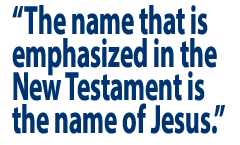Regarding the creation of mankind, the Westminster Shorter Catechism (Q10) asks “How did God create man?” And it answers the question by stating “God created man male and female, after his own image, in knowledge, righteousness, and holiness, with dominion over the creatures” (emphasis mine). And because we are made in the image of God, we are to image Him (as only man can), in all of our being. We tend to look at this section of Genesis (1-3) as man either obeying and disobeying God strictly in their ethic (how they live their lives).
But as God’s creatures, Adam and Eve were to be Yahweh’s servant with all their being. We are told that the greatest commandment is “to love the Lord your God with all your heart, and with all your soul, and with all your mind, and with all your strength” (emphasis mine). This commandment, although not stated in Genesis was certainly Adam greatest commandment. And just as we are not to love and serve God in our own strength, according to our own dictates, Adam, again, was no different.
It is clear from the NT that part of the image that is being restored has to do with knowledge. What we know, how do we know it, etc. One picture of the Christian, is that he is as priest, offering up to God our own bodies (including our minds) as living sacrifices, and in doing so our minds will be transformed, to know God’s will. We are told in other places that we are to “take every thought captive to the obedience of Christ” (2Cor. 10:5). In Eph. 4:22-23 Paul states “You were taught, with regard to your former way of life, to put off your old self, which is being corrupted by its deceitful desires; to be made new in the attitude of your minds; and to put on the new self, created to be like God in true righteousness and holiness.” and in Col. 3:10 Paul continues this line of reason stating “and have put on the new self, which is being renewed in knowledge in the image of its Creator.”
If one of the goals of our sanctification is that we are “think God’s thoughts after him” as Cornelius Van Til stated, we can safely assume that in the garden, prior to the fall, Adam possessed the knowledge Paul speaks about in the above verses. The difference being, that Adam before the fall did not have to “take every thought captive,” this was a given. Adam, prior to the fall, was thinking God’s thoughts after Him.
Being made in the image of God, man was to be God’s prophet, priest and king. He was to rule over creation, he was to subdue creation and he was to proclaim the works and mind of the mind of his creator to the creation. After all, if Adam failed in any of these before the actual fall, we would have a pre-fall. But we know this wasn’t the case.
When we look at the teachings of Mr. Greg Stafford, we see the roles of prophet exchanged from man being the prophet of God, to God being a prophet for man. Mr. Stafford has established for himself (with the help of Jehovah’s Witness publications) that there is knowledge God is not aware of and can not know until man reveals it. After man says what he says, it becomes revelation for God, and now God can speak forth what Adam, a part from his image-bearing, has made known. Remember, Mr. Stafford has told us in the past, that when God commanded Adam to name the animals, God himself did not know what Adam was going to name them. God’s knowledge was limited to the free choices of man. God, now thinks man’s thoughts after him.
One important point to recognize here is that built into in Mr. Stafford’s theology, is a place for man’s autonomy. He (man) is a law unto himself. Before the fall, he can do things and say things without thinking God’s thought after him. Man, apart from God, makes decisions, which in the end, bind God and instead of man being the prophet for God, God becomes the mouth piece for man. Man becomes the final reference point and the the creator-creature distinction is blurred.
I can not say it better than Van Til at this point when he states “It is only when this point is carefully noted that the Christian and the non-Christian points of view are seen in their right relationship to one another. The two positions have mutually exclusive views of the ultimate reference point in predication” (Christian Apologetics, 2ed., 43).
[Note: The thoughts in this post are being developed for a paper I am currently writing for an apologetics class. When finished, Lord willing, I will post the paper on the blog].



